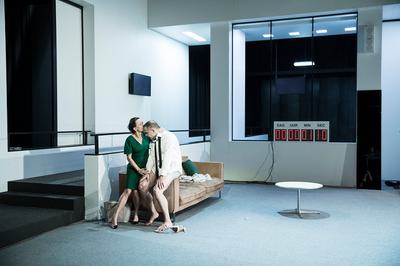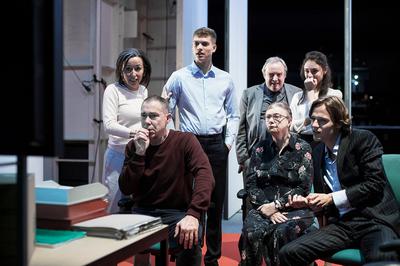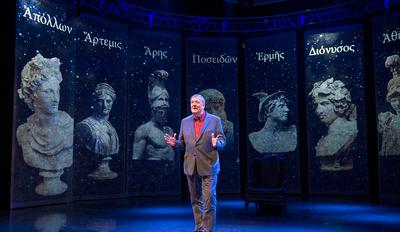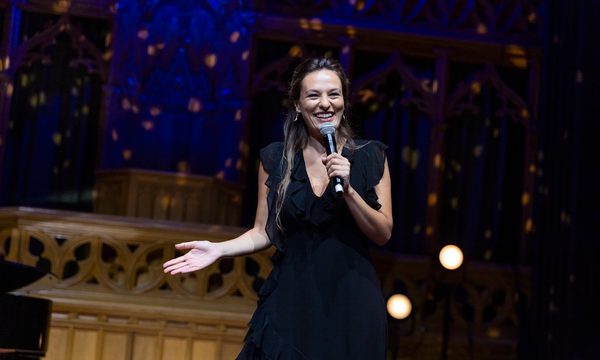
News Story
In 1821, the poet Percy Bysshe Shelley argued – in the preface to his play Hellas – that ‘we are all Greeks. Our laws, our literature, our religion, our arts have their root in Greece’.
Today, you’d be hard pressed to look at any one year of theatre, opera or dance programming and not see a familiar name in there – Sophocles, Aeschylus, Euripides, Homer, Aesop, Aristotle. Playwrights, poets, novelists – there have been so many attempts to adapt, rework, reimagine these stories. Greek tragedy was the blueprint for the creation of modern drama and most films and plays today still follow the format and structure of Ancient tragedies: a hero, an obstacle, the struggle to overcome it, and the victory at the end or the appearance of an unexpected help at the final moment – a deus ex machina.
Tragedies hold a mirror up to their audience and liberate the imagination from the constraints of social realism. The hero is neither evil nor exemplary, but recognisably human. Through their actions, the audience is in turn subjected to the same dilemmas, thoughts, emotions and remorse.
What continues to fascinate us about these works from the 5th-century BC? Why are they so enduringly popular, and what do they tell us about ourselves? Two shows at this year’s International Festival, Robert Icke’s Oedipus and Stephen Fry’s Mythos: A Trilogy, re-examine the Greeks, reworking them for the 21st century audience.

Robert Icke’s got form when it comes to Greek drama. His adaptation of Aeschylus’ Oresteia premiered to universal critical acclaim at London’s Almeida Theatre in 2015, before transferring to the West End, a rare feat for a Greek tragedy. In Icke’s adaptations, everything from the original play that suggests foreknowledge is excluded – you don’t need to know your Achilles from your Ajax to appreciate them.
Icke: I suppose, for me, it was always about wanting the 15-year-old [me] to have a really good evening and feel like they had everything available to them even if they hadn’t read a word of classical Greek. I don’t understand the point of getting everyone in the same room if a first-time buyer can’t have as good a time as the people who can read Greek.
If the adaptation works correctly, then the audience will connect with the deeply human emotions these stories hold.
Icke: That’s the genius of the Greek: it says to you, “You’re probably never going to have to command an army, but you probably are going to have to make hard life decisions.” I think the Greeks stick with us because these things don’t go away.
Icke wants to avoid the spectator from seeing the performance in the light of previous versions.
Icke: When you deliver a classic your primary responsibility is to try and catch some of the lightning in the bottle that made it happen when it first happened.
Greek tragedies can only have the same effect on a contemporary audience as on the audience from 2,400 years ago if they are adapted. For his Oresteia, Icke received the Olivier Award for Best Director in 2016, the youngest ever winner, with his production being hailed as ‘Aeschylus for the modern age, rightly leaving us to draw our own conclusions about the shaky premises on which political leaders go to war’ by The Guardian.
In Oedipus, Icke’s protagonist is transformed into a charismatic politician, awaiting the results of an election that will sweep him to victory. Subtle tweaks to the plot keep the audience on the edge of their seats.
Icke: Since the beginning, both audience and artists have been fascinated by Oedipus: the story of a man who, in his success, exceeded limits, only to find out that he had crossed the most fundamental of boundaries in doing so. I am fascinated by the way plays can make genres explode, just like events can make lives explode. Aristotle’s notion of the ‘hamartánein’ – that which makes the protagonist meet his doom – is often translated as a tragic defect. But perhaps it can be better and more simply translated as a mistake or error? Everyone makes mistakes once in a while. Everyone deviates from the plan. But what do we do when our mistakes have been made before? What if our mistakes are the plan? What if those mistakes can no longer be undone? What is our fate? Are we merely the actors in a script that has already been written? By our parents? By the gods? By our own bodies? How can we see through ourselves enough to stop before it is too late? How can we ever know ourselves well enough?

Stephen Fry’s Mythos shows are adapted from his recent book of the same name. Falling in love with the stories as a young boy, Fry remains fascinated by the relevance of these myths today – somewhere between fact and fiction, they allow an examination of why we are what we are.
Fry: The mythic space is a place where you can tell absolute truths about human experience.
In Gods, he takes us from the chaos of the beginning, to Titans, and the origins of the Olympic pantheon. Heroes handles the exploits of Greece’s greatest champions, Heracles, Perseus and Theseus. Men recounts the events of the Trojan War and Odysseus’s journey homewards. While each show stands alone, you’ll get the widest knowledge of the legends of Ancient Greece by seeing all three. The beauty of Fry’s versions is their accessibility, with references to pop culture, modern literature and music weaved through them, making them far more immediate to a modern audience.

Fry: If you want to tell a story about humanity, then mythology seems to be the best way to do it, if you do it in your own time it looks like it’s a political comment on this particular style of government, or this particular class of person, whereas mythology is so universal.
Then there’s Fry himself – an endlessly witty travelling companion, he’s one of our finest storytellers, and captures the warmth and humanity of these classic tales, guiding us into seeing ourselves in the exploits. These are not dusty academic recounting, but gloriously colourful, contemporary, joyfully alive.
Internationaal Theater Amsterdam's production of Oedipuscomes to the King's Theatre on 14-17 August while Stephen Fry's Mythos: A Trilogy. Gods, Heroes, Men plays at the Festival Theatre from 19-25 August.


